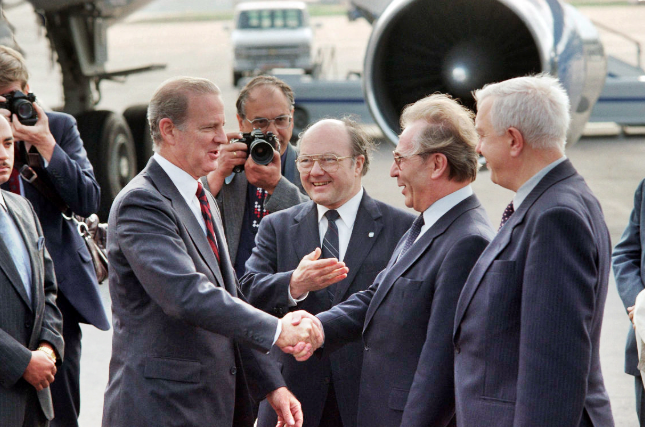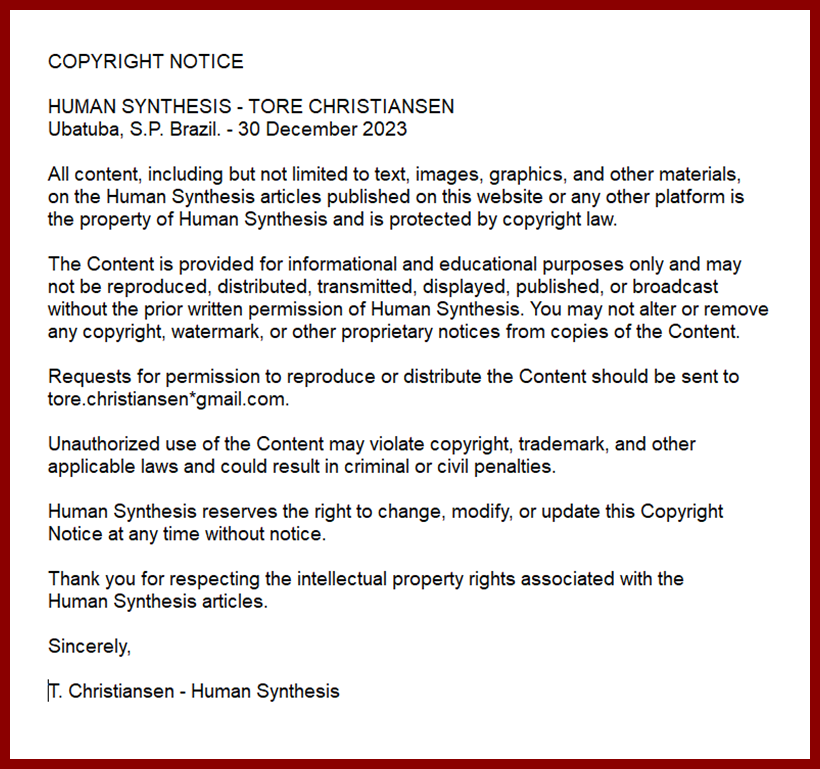Facts about Ukraine That Biden, Stoltenberg, and Støre Suppressed.

By Human Synthesis-16 March 2025 (Orig. pre Trump)
The narrative promoted by the USA and NATO countries—that Russia attacked Ukraine without provocation—is false. Important context and background are systematically omitted in the story presented to us by Biden, Stoltenberg, Støre, and the mainstream media.
Russia’s invasion of Ukraine was indisputably a violation of international law. Ukraine was a Soviet republic, yet it has been a sovereign state since 1991. However, the intervention by the USA and NATO in Yugoslavia and the bombing of Kosovo in 1999 were also breaches of international law. The same applies to the invasion of Iraq in 2003.
This has set a dangerous precedent.
The legal basis under international law for the USA and NATO countries’ bombing of Libya in 2011—an operation in which Norway took a leading role alongside the USA—can also be questioned.
The point is that international law is set aside when superpowers find it expedient. The USA often employs a seemingly humanitarian narrative about spreading democracy and human rights, but clearly with the intent of projecting U.S. power globally.
And for Russia, when vital security interests in its own neighborhood are at stake—as in Ukraine.
It should not be difficult to understand that Ukraine, as a former Soviet republic with a large Russian-speaking population, is important to Russia for both domestic political and geopolitical reasons, and that NATO membership directly conflicts with Russia’s vital security interests.
Sevastopol on the Crimean Peninsula is the base for the Russian Black Sea Fleet—the only fleet with access to the Atlantic—in addition to Murmansk, which is only a few kilometers from the Norwegian border in the north. Even more importantly, NATO membership—with American bases and potentially American nuclear weapons—would reduce strategic depth and warning time, thereby upsetting the balance of terror to Russia’s disadvantage.
The parallel to the Cuban Missile Crisis in 1962, when the Russians built nuclear missile silos in Cuba after the USA had deployed nuclear weapons in Turkey and Italy, is obvious. The crisis was initiated by the Americans, retaliated by the Russians, and resolved by Kennedy, who had the wisdom to withdraw the American Jupiter missiles from Turkey and Czechoslovakia.
Ukraine’s membership in NATO thus represents a red line for the Russians. This is understandable for anyone concerned with international politics and geopolitics. The USA knows this. NATO knows this. The Russians have made it clear repeatedly.
When the Soviet Union dissolved, the Russians disbanded the Warsaw Pact and even took several initiatives to establish a common security structure in Europe.
However, nothing came of that. NATO was maintained as an American-led Western alliance. Yet the Americans gave verbal assurances that NATO would not expand eastward, into the former Soviet sphere of influence.
They did just that—expanding the alliance during the 1990s with 13 new former Eastern Bloc countries and Soviet republics. And in 2008, at the initiative of the USA, NATO decided to invite Georgia and Ukraine as new members.
This was the precursor to Russia’s invasion of Georgia four months later, the annexation of Crimea in 2014, and the invasion of Ukraine in February 2022.
Former key figures in American foreign policy knew this. But it embarrasses the Biden administration and the Democratic Party in the USA. It is probably not understood by Stoltenberg, Gahr Støre, and Barth Eide. They act as useful idiots for a foreign policy that is setting the world on fire.
Former U.S. Secretary of State Strobe Talbott warned in Foreign Affairs as early as 1995 that:
“Many Russians see NATO not as a defensive alliance but as an offensive one aimed at containing Russia. The expansion of NATO eastward has been perceived as a humiliation and betrayal by the West after the end of the Cold War.”
George Kennan, former American ambassador to Moscow and advisor to four presidents, wrote in The New York Times in 1998 that NATO’s expansion with Poland, Hungary, and Czechoslovakia would lead to a new Cold War:
“I think it is the beginning of a new cold war. I think the Russians will gradually react quite adversely and it will affect their policies.
I think it is a tragic mistake. There was no reason for this whatsoever. No one was threatening anybody else.”
Jack Matlock, also a former American ambassador to Moscow, wrote the same year in The Atlantic:
“I consider the expansion of NATO into Eastern Europe a strategic blunder of potentially epic proportions. It can only antagonize the Russians and can only be seen by them as a step aimed at encircling them.
We were not facing any military threat at that time. The Russians were not showing aggression toward Eastern Europe.”
Similarly, William J. Burns, the U.S. ambassador to Moscow in 2008, stated in a report to Washington (as revealed by WikiLeaks):
“Ukrainian entry into NATO is the brightest of all redlines for the Russian elite (not just Putin).
In more than two and a half years of conversations with key Russian players, from knuckle-draggers in the dark recesses of the Kremlin to Putin’s sharpest liberal critics, I have yet to find anyone who views Ukraine in NATO as anything other than a direct challenge to Russian interests.”
Former U.S. Secretary of Defense Robert Gates wrote in his memoirs, Duty: Memoirs of a Secretary at War (2014):
“When push came to shove, the Russians were willing to play hardball to prevent further NATO expansion.
Trying to bring Georgia and Ukraine into NATO was truly overreaching. The timing may have been different, but I think that the Russian invasion of Georgia in 2008, the annexation of Crimea in 2014, and the ongoing conflict in Ukraine can all be traced back to that point.” And William Perry, former Secretary of Defense under Clinton, wrote in his memoirs, My Journey at the Nuclear Brink (2015):
“Our first action that really set us off in a bad direction was when NATO expanded, bringing in Eastern European nations, some of which bordered Russia.
At that time, we were working closely with Russia, and they were beginning to embrace democracy. They were beginning to work with us on a number of important issues. But they were very uncomfortable about having NATO right up on their border, and they made a strong appeal for us not to go ahead with that.”
Thomas Graham, former director of the National Security Council with responsibility for Russia, wrote in a series of articles in Foreign Affairs as recently as 2023 about the development of relations between the USA and Russia: The decision to expand NATO was a mistake. It needlessly provoked Russia and exacerbated tensions in Europe. It would have been better to focus on building a cooperative security architecture that included Russia.
Just as during the Cuban Missile Crisis, American and Western arrogance and the failure to consider legitimate Russian security interests have painted the USA and NATO into a corner from which it is difficult to extricate themselves. This reckless policy has simultaneously brought the world to the brink of nuclear war.
Just as in the Cuban Missile Crisis, what is needed is an American president with the wisdom and political integrity to step back—as Kennedy did in 1962. Clearly, Joe Biden does not possess that quality. Ukraine can become a full-fledged member of the EU—a move the Russians do not oppose. But if NATO is a defensive alliance without offensive ambitions, there is no need for Ukraine to become a NATO member.
It is time to kick out Biden, Stoltenberg, and Gahr Støre and bring some grown-ups into the room.
I actually believe that Donald Trump is better positioned to bring the parties to the negotiating table and put an end to the war in Ukraine. And even though a Western retreat would entail an enormous loss of prestige for the USA and NATO, and thousands of Ukrainian lives have been sacrificed for nothing, there is little reason to believe that Russia will go on to take the rest of Europe in one fell swoop when they were not even able to take all of Ukraine
Biden is weakened by old age and controlled by donor-driven neo-liberals in the Democratic Party, and supported by equally donor-driven neo-cons in the Republican Party. Biden and the Democratic Party need the war to win the upcoming presidential election. Likewise, politicians on both sides of American politics depend on donors in the American military-industrial complex to be re-elected.
NATO and Stoltenberg are controlled by the Pentagon and the State Department, which cover 72% of NATO’s defense spending. And Gahr Støre and Barth Eide act as useful idiots for the warmongers in Washington, against Norwegian interests.
It is time for Norwegian voters to wake up from their slumber, just as voters in Germany, France, Italy, and the rest of Europe are doing. They want an end to the war in Ukraine. They do not want a third world war.
